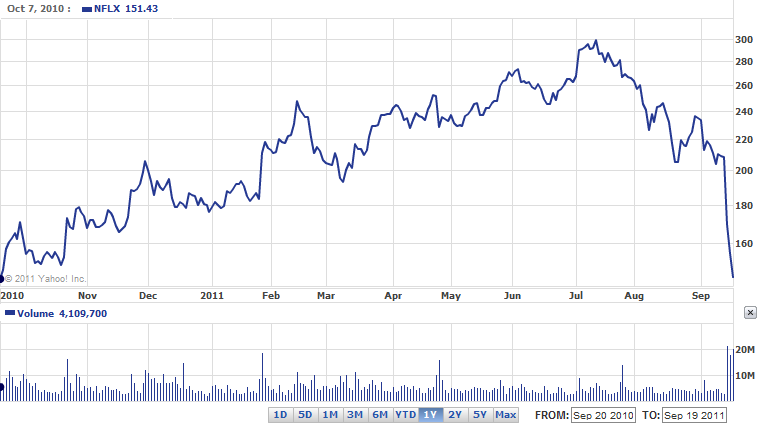And with the sound of Wall Street’s opening bell, Netflix quickly dipped below its 52 week low, opening at $141.40 but falling within a few seconds under $140. [NASDAQ:NFLX] Over the past two months the company watched subscribers leave along with 55% of its market cap from the same time period — which now places their valuation at its 52 week low of $7.46B. On July 12, 2011, just one day prior to Netflix’s all-time high price of 304.79, the company announced a radically different corporate structure and also raised the price of the most popular subscription plan by 60%.
Sure, it’s still the top consumer of internet bandwidth and the de facto leader in video streaming services, but the company’s stock has lost a year of growth in a matter of two months, or rather, two decisions.

Most should know the storyline by now: Netflix split the company into two separate divisions two months ago and raised the price of a popular subscription. A consumer backlash rightly ensued. Then late Sunday night Netflix took it even farther and announced that an entirely new company, Qwikster, would handle the DVD mailers while Netfix would do just streaming. A media snarkfest ensued while the stock price continued its nose dive.
Both Goldman Sachs and Barclays Capital recently lowered their price targets on shares of Netflix, with the former pricing the stock’s 6-month, DCF-derived target price at $270, down from $330. Barclays now labels the Netflix stock as overweight and repriced their target from $285 to $260. Last Friday, Caris & Company even downgraded shares of Netflix from above average to simply average. These shifts come as the company announced late last week that it lowered its Q3 subscriber projection by a million subs spanning both the streaming and DVD rental business.
Reed Hastings Sunday night blog post stated in part that while the now two companies are done with price increases, the decision to completely separate DVD and streaming will help both businesses by letting “each grow and operate independently.” Qwikster was then announced, which will continue the task of servicing and mailing DVDs — and now games, too.
Netflix’s slide from grace is exactly what Reed Hasting said he was trying to avoid. He stated that his recent moves were to prevent his company from moving before its too late. Aol and Borders are used as examples, which now seem rather appropriate as Netflix’s stock crashes through charts much as those two companies’ did.
